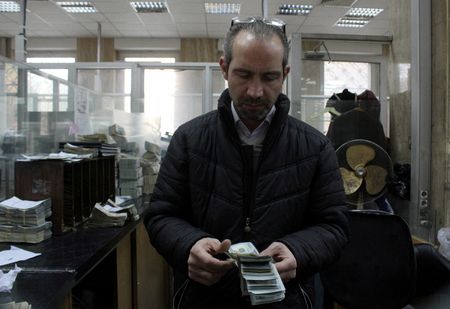By Timour Azhari, Andrew Mills
BEIRUT (Reuters) -The United States has greenlighted a Qatari initiative to bankroll Syria’s public sector, three sources said, offering a financial lifeline to the new Syrian government as it seeks to rebuild a state shattered by conflict.
Qatar, which is among Syrian President Ahmed al-Sharaa’s strongest international backers, had been reluctant to act without the blessing of Washington, which imposed sanctions when ousted leader Bashar al-Assad was in power.
The Syrian finance minister confirmed in a statement on Wednesday that Qatar was set to provide Syria with $29 million monthly for three months, which can be extended, in order to pay salaries to civilian public-sector workers.
The grant was given a U.S. sanctions exemption, the finance minister said, adding that it will be operated by the United Nations Development Programme.
Sanctions, 14 years of conflict and decades of crony rule under Assad have bankrupted the state and left civil servants living on a pittance. Meanwhile, Sharaa’s government has achieved only partial success in convincing wary Western states that he has turned his back on his Islamist past.
Two people briefed on the matter told Reuters that Qatar had been informed about the U.S. green light and said the U.S. Treasury Department’s office of Foreign Assets Control was expected imminently to provide a letter confirming that the initiative was exempt from U.S. sanctions.
The move suggests a softening of Washington’s position, while European states have moved more swiftly to ease their sanctions.
A Syrian financial source said the funding was conditional, and could go only to civilian Syrian public-sector civil servants, with the interior and defence ministries not included.
That reflects Western concerns over the fundamentalist history of the group that now rules Syria and is reconstituting its security forces, the source and diplomats said.
The financial source said the funding was expected to come through starting next month, allowing for a long-awaited 400% salary rise to be gradually rolled out to more than a million state employees over several months.
AMBIGUITY OVER U.S. SANCTIONS
All sources spoke on condition of anonymity because they were not authorised to speak on the matter.
Qatar’s Ministry of Foreign Affairs and the U.S. Treasury did not immediately respond to requests for comment.
Syria’s government would come up with the funds to match the salary rise for employees not included in the Qatari-backed initiative, the Syrian source said.
Qatar had planned to provide salary support since soon after Assad was toppled by Islamist rebels Hayat Tahrir al-Sham (HTS) last year. The initiative has been held up by ambiguity over U.S. sanctions and the Trump administration’s Syria policy.
But there are signs that Gulf Arab states have been able to make modest headway in lobbying the U.S. to at least allow for engagement with Damascus, with Saudi Arabia and Qatar last month paying off Syria’s debts to the World Bank, which opened the door to grants and loans.
Saudi Arabia also co-hosted a high-level Syria-focused meeting at the IMF and World Bank Spring Meetings in Washington last month, attended by Syria’s finance minister and central bank governor for the first time in more than a decade.
ECONOMIC PRIORITY
The previous U.S. administration issued a sanctions exemption on January 6 to allow transactions with Syria’s governing institutions for six months, though states and entities seeking to engage with Syria have sought additional guarantees.
Known as a general licence, it marked an effort to ease the flow of humanitarian assistance and allow work with the Syrian energy sector, while keeping sanctions in place overall.
Sharaa has called repeatedly for the lifting of Western sanctions, imposed to isolate Assad for his crackdown during Syria’s civil war, which started in 2011.
Boosting the economy, which has now been opened up in a free market experiment after decades of protectionism, is a top priority for Sharaa.
The United Nations says nine out of 10 Syrians live in poverty.
The country’s interim finance minister in January said that pay for public-sector workers would be increased by 400% from February at an estimated monthly cost of 1.65 trillion Syrian pounds ($130 million).
He had cited regional aid as one source of funding for the increase.
Western policy in Syria is complicated by the jihadist origins of HTS, the armed group that led the push that ousted Assad and is designated a terrorist group by world powers.
HTS emerged from the Nusra Front, an al Qaeda affiliate in Syria until Sharaa broke ties in 2016. HTS was officially dissolved in January.
(Reporting by Timour Azhari in Beirut and Andrew Mills; Editing by William Maclean and Matthew Lewis)











